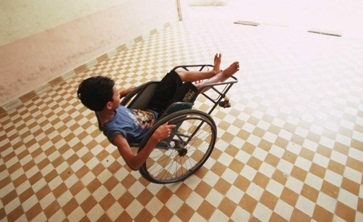UN report highlights technology’s potential to foster inclusion of persons with disabilities
http://www.un.org/apps/news/story.asp?NewsID=45958&Cr=disab&Cr1=#.UkhHbjcrWyg (ขนาดไฟล์: 167)
24 September 2013 – A report released today by the United Nations and its partners illustrates how information and communication technologies (ICTs) can help give access to resources to persons with disabilities.
The report, “The ICT Opportunity for a Disability-Inclusive Development Framework,” contributes to a better understanding of the extent to which ICTs can enable the social and economic inclusion of persons with disabilities. It lists challenges that are still to be addressed, while outlining concrete actions to help achieve a disability-inclusive development agenda.
“The use of information and communication technologies should be at the heart of any strategy to promote the social and economic inclusion of persons with disabilities,” said the Secretary-General of the International Telecommunication Union (ITU), Hamadoun I. Touré. “We have the tools at our hands; the remaining challenge is to expand access to these technologies to all and to make ICTs accessible and affordable for persons with disabilities.”
The report is based on feedback from a global consultation carried out earlier this year in support of the preparatory process for the High-Level Meeting on Disability and Development (HLMDD), which took place at UN Headquarters yesterday.
The consultation gathered over 150 expert inputs from relevant organizations and key individuals from over 55 countries, representing governments, academic institutions, organizations of persons with disabilities, civil society organizations, the private sector and regional and international organizations.
Some of the challenges highlighted in the report include the cost of making ICTs accessible to persons with disabilities, a lack of policies to foster accessible ICTs, and limited availability and use of ICTs in general.
The report stresses that governments play a key role in introducing ICT-enabled solutions adapted to the needs of persons with disabilities, and private sector entities can contribute by increasing research and development efforts to develop accessible ICTs. For their part, civil society organizations have a key role in raising awareness of accessibility barriers.
Released during a side event of yesterday’s High-Level Meeting, the report is the result of collaborative input from the UN Broadband Commission for Digital Development, the Global Initiative for Inclusive ICTs, the International Disability Alliance, ITU, Microsoft, the Telecentre.org Foundation and the UN Educational, Scientific and Cultural Organization (UNESCO).
ที่มา: http://www.un.org/apps/news/story.asp?NewsID=45958&Cr=disab&Cr1=#.UkhHbjcrWyg (ขนาดไฟล์: 167)
วันที่โพสต์: 13/10/2556 เวลา 01:35:52 
![]()
![]()
แสดงความคิดเห็น
รายละเอียดกระทู้
Photo: World Bank/Masaru Goto http://www.un.org/apps/news/story.asp?NewsID=45958&Cr=disab&Cr1=#.UkhHbjcrWyg 24 September 2013 – A report released today by the United Nations and its partners illustrates how information and communication technologies (ICTs) can help give access to resources to persons with disabilities. The report, “The ICT Opportunity for a Disability-Inclusive Development Framework,” contributes to a better understanding of the extent to which ICTs can enable the social and economic inclusion of persons with disabilities. It lists challenges that are still to be addressed, while outlining concrete actions to help achieve a disability-inclusive development agenda. “The use of information and communication technologies should be at the heart of any strategy to promote the social and economic inclusion of persons with disabilities,” said the Secretary-General of the International Telecommunication Union (ITU), Hamadoun I. Touré. “We have the tools at our hands; the remaining challenge is to expand access to these technologies to all and to make ICTs accessible and affordable for persons with disabilities.” The report is based on feedback from a global consultation carried out earlier this year in support of the preparatory process for the High-Level Meeting on Disability and Development (HLMDD), which took place at UN Headquarters yesterday. The consultation gathered over 150 expert inputs from relevant organizations and key individuals from over 55 countries, representing governments, academic institutions, organizations of persons with disabilities, civil society organizations, the private sector and regional and international organizations. Some of the challenges highlighted in the report include the cost of making ICTs accessible to persons with disabilities, a lack of policies to foster accessible ICTs, and limited availability and use of ICTs in general. The report stresses that governments play a key role in introducing ICT-enabled solutions adapted to the needs of persons with disabilities, and private sector entities can contribute by increasing research and development efforts to develop accessible ICTs. For their part, civil society organizations have a key role in raising awareness of accessibility barriers. Released during a side event of yesterday’s High-Level Meeting, the report is the result of collaborative input from the UN Broadband Commission for Digital Development, the Global Initiative for Inclusive ICTs, the International Disability Alliance, ITU, Microsoft, the Telecentre.org Foundation and the UN Educational, Scientific and Cultural Organization (UNESCO).
จัดฟอร์แม็ตข้อความและมัลติมีเดีย
รายละเอียดการใส่ ลิงค์ รูปภาพ วิดีโอ เพลง (Soundcloud)


